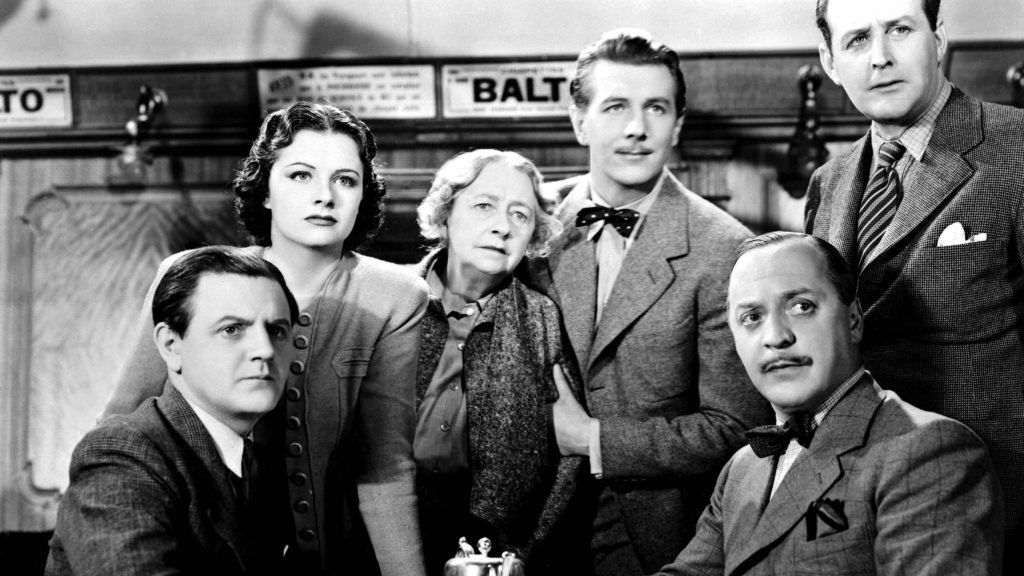My first Alfred Hitchcock movie wasn’t Psycho or Rear Window or any of the other titles which had become, like that of their director, household names. Back when I was a little kid, a lot of old films had fallen into the public domain and aired over and over in ratty transfers on high-numbered UHF channels during weekend afternoons. That’s how I first saw The Lady Vanishes. I’m not 100% sure why that, as a young boy who probably really should have been playing outside, I had decided to sit down and watch a black-and-white British film featuring no famous actors I’d ever heard of; I guess probably because it got four stars in the TV guide. I’d heard of Hitchcock, of course. It was impossible not to have. But at that age I probably knew the silhouette more than the man, thanks to the cultural ubiquity of what we would today crassly refer to as his brand.
In any case, I figured that if I was going to be a worldly young man who understood what this whole cinema thing was about, I’d better familiarize myself with The Master of Suspense. So it came much to my surprise that despite its ominous title, The Lady Vanishes featured no psychos nor scary incidents of vertigo, but was rather a rollicking mystery comedy about a bunch of bumbling strangers on a train, all looking for a busybody old biddy who apparently disappeared while our protagonist was taking a nap. I recall being hooked by the setup and delighted by the revelations that followed. This was an important afternoon for me, as a kid obsessed with the latest Star Wars and Spielberg pictures realized that old black-and-white movies could also be a blast. I had so much fun watching The Lady Vanishes that I put off seeing it again for another 40 years or so, fearing that the film couldn’t possibly live up to the thrill of that first discovery.
This was silly of me, as the movie remains marvelous. The perfect introduction for a semi-sophisticated eight or nine-year-old, it’s frothy and funny in a manner Hitchcock would not attempt again until North By Northwest. (Other Hitchcock movies are full of humor, but usually sickly so.) The Lady Vanishes might be his least neurotic film, spending its first 30 minutes as a flat-out farce, with a swarm of colorful railway travelers descending on an ill-prepared hotel after an avalanche strands them all overnight in a made-up, music-crazed Eastern European country. Michael Redgrave’s dashingly irreverent musicologist immediately gets on the nerves of Margaret Lockwood’s engaged ingénue, and from the moment she calls him the most inconsiderate person she’s ever met, the audience already can’t wait for them to get together.

Once the train finally gets rolling again, Redgrave’s the only one who believes her about Miss Froy (May Whitty), a fussy old bird who has seemingly vanished without a trace. There are some suspicious characters aboard trying to gaslight Lockwood into believing the woman was but a figment of her imagination – perhaps a concussed after-effect of a flowerpot that fell on our heroine’s head back at the station before their departure. Or was the flowerpot pushed?
Scripted by the team of Sidney Gilliat and Frank Launder, The Lady Vanishes is one of Hitchcock’s most intricate contraptions. But it doesn’t feel as fussily designed as his other pictures, thanks to a bustling ensemble getting up to comic hijinks that obscure the mechanics. (Hitchcock obsessive Francois Truffaut confessed that he’d often started watching it with the intention of studying the picture’s craft but always ended up so engrossed he’d forget to take notes.) The espionage stuff keeps getting tripped over by kooky characters such as two cricket-happy Englishmen obliviously blundering their way into aiding and abetting the bad guys, or the adulterous couple whose ardor we watch fade before our eyes in real time. But best of all is Miss Froy herself, who turns out to be [spoilers for an 87-year-old movie] the coolest and most unexpected spy this side of Julia Child.
Revisiting the film today it’s impossible not to notice a sly commentary on then-current political events. Looked at from a certain angle, The Lady Vanishes can be seen as a barely-veiled critique of British non-interventionism, with those selfishly trying to mind their own business only making matters worse, while a character who spends the picture arguing for appeasement shot in the back while waving a white flag of surrender. Hitchcock lingers on his death just long enough for it to rock the movie’s mood a little bit, a reminder that this isn’t all fun and frivolity.
“The Lady Vanishes” is streaming on the Criterion Channel, HBO Max, PlutoTV, and Hoopla.



